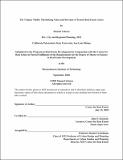The T-Space Model : maximizing value and revenue of transit real estate assets
Author(s)
Velazco, Manuel,S.M.Massachusetts Institute of Technology.
Download1227097538-MIT.pdf (29.37Mb)
Alternative title
Maximizing value and revenue of transit real estate assets
Other Contributors
Massachusetts Institute of Technology. Center for Real Estate. Program in Real Estate Development.
Advisor
John F. Kennedy.
Terms of use
Metadata
Show full item recordAbstract
We founded T-Space in response to the underutilization of transit stations and the opportunity it presents itself being a high volume, small footprint space with a strong network to residential neighborhoods and employment centers. As a team, we found ourselves asking: Can transit stations be an alternative space for retail service? Can we bring convenience to commuters? Can we add to the neighborhood identity through modernization and wayfinding strategies? Can we help transit agencies improve their real estate source of income? This thesis articulates the T-Space business model developed through MIT's DesignX accelerator program. T-Space, short for Transit Space, is a real estate company focused on modernizing stations and improving the quality of life for commuters. Our mission is to revitalize these untapped assets and incorporate innovative retail technology for convenience. By modernizing transit stations across the United States, we have an opportunity to better connect transit stations to its community while increasing the real estate revenue source for the transit agency. At the same time, retailers can test new markets, while commuters benefit from automation and self-service. In our efforts of developing a business model that works for transit agencies, retailers, and commuters, we hope the success of projects contribute to an increase in ridership.
Description
Thesis: S.M. in Real Estate Development, Massachusetts Institute of Technology, Program in Real Estate Development in conjunction with the Center for Real Estate, September, 2020 Cataloged from student-submitted PDF of thesis. Includes bibliographical references (pages 58-59).
Date issued
2020Department
Massachusetts Institute of Technology. Center for Real EstatePublisher
Massachusetts Institute of Technology
Keywords
Center for Real Estate. Program in Real Estate Development.